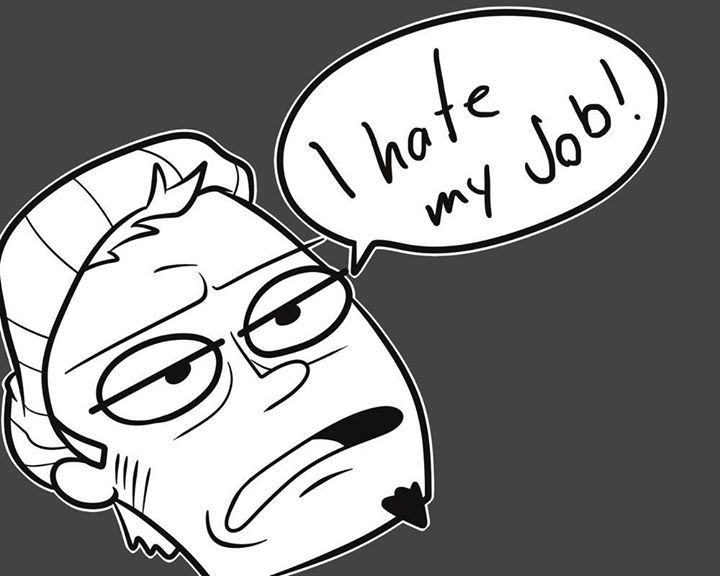Introduction
 Going to work every day with lead in your shoes, but changing jobs somehow doesn’t work for you. Because yes, your colleagues are very pleasant and a fixed income is also worth something. For example, 1 in 5 western people is ‘locked up in a job’. And that is not without consequences, according to research by an organizational psychologist.
Going to work every day with lead in your shoes, but changing jobs somehow doesn’t work for you. Because yes, your colleagues are very pleasant and a fixed income is also worth something. For example, 1 in 5 western people is ‘locked up in a job’. And that is not without consequences, according to research by an organizational psychologist.
How is it possible that so many people are in a job they do not really like, yet they do not actively search for a solution? Read on and find a real solution for your situation.
Own experiences
The psychologist provides strategic organizational advice to companies through her own company. All the experience was gained by working for years in the business itself. Being up close it became obvious how many people actually are dissatisfied with their work and go to the office every day with an unpleasant feeling.
At the same time, this expert noticed that not enough was done about this problem from her side. “I noticed that a change in mindset is needed for the entire labor market. I thought: if I want to achieve that, then I have to make sure that I become an expert in this field. That’s what I became when I obtained my Ph.D. on the subject of ‘being locked up in the job’.”
Success story

People in general should always do everything they can to remain satisfied in their work. That seed was planted in primary school. “I was told in primary school that I had to go to secondary school because of my dyslexia. Many of my classmates went to college. I could only think: ‘I’m going to get there too’. So after secondary school, I completed a bachelor’s degree and continued on my way to university. I am now two master’s degrees further and I have been promoted.”
No real emphasis
One of the most important questions that need to be answered is: why do people continue to do work that they are dissatisfied with? The researcher discovered that little attention is paid to the subject of dissatisfaction in the western labor market. “As a result, there is little talk about it in the workplace.” Obviously, the management is not interested either. Things are going well or not? Ok, there is some absenteeism, but what is the big deal?
So, what is really happening?
The conclusion of the research was that despite their dissatisfaction, employees often focus on other factors of their work. “What often keeps  people going more or less is the salary, just like how long you have been working somewhere. For example, I regularly heard ‘yes, but I’ve been working here for 20 years, I can’t just leave. Many disgruntled employees speak for themselves. Those nice colleagues are worth staying ahead of, right? It is very difficult to let go of the safety of a team and the stability.”
people going more or less is the salary, just like how long you have been working somewhere. For example, I regularly heard ‘yes, but I’ve been working here for 20 years, I can’t just leave. Many disgruntled employees speak for themselves. Those nice colleagues are worth staying ahead of, right? It is very difficult to let go of the safety of a team and the stability.”
But we also often stay in a job because we ended up there after so many years of studying, learning, and working, the researcher noted. “We impose on ourselves that there must always be an upward trend in a career. But why not take a step back after a management position? Many people secretly prefer to work with their hands. Such a job may pay less, but it will probably make you happier.”
Too late in the action or none at all
Staying in a job if you feel locked up can have negative consequences, the expert warns. “If you don’t take action, that dissatisfaction can turn into serious mental problems. In the beginning, you think it’s not that bad, but then a phase often comes in which you have to deal with stress and energy exhaustion on a daily basis.”
This group of unfortunate employees goes to bed with work and wakes up with it, which only aggravates the complaints. “After that, you get to the level of the vicious circle, these people I call ‘high locked’ individuals. They eventually end up with burnout. To my surprise, this applies to one in three employees who feel trapped in their jobs.”
Here is the kicker
The psychologist also discovered that people remain in this dissatisfied work situation for an average of 2.5 years. “That’s such a shame. In fact, someone should be aware of this dissatisfied feeling much earlier and take action on it.” The problem is that we often don’t act until the choice is made for us (thrown out) or when something big happens in our lives. Such as a death in the family or the birth of a child. Then suddenly the realization comes: who am I actually doing this work for and do I still enjoy it so much? We should ask ourselves this much more often, even if things are going well.”
fact, someone should be aware of this dissatisfied feeling much earlier and take action on it.” The problem is that we often don’t act until the choice is made for us (thrown out) or when something big happens in our lives. Such as a death in the family or the birth of a child. Then suddenly the realization comes: who am I actually doing this work for and do I still enjoy it so much? We should ask ourselves this much more often, even if things are going well.”
So, what do you do in such a case? How do you start this search?
Find out why you don’t like it
The feeling that you are out of place comes from somewhere. Why aren’t you having a good time? It is important to be able to name this before the conversation you are going to have, but also so that you know what to look out for in a possible new job.
To find a solution, you need to know where the problem exactly lies. It could be due to one of the following reasons:
The work is not what you expected
You don’t get along with your new manager or colleagues
You are not satisfied with your new work location
You already notice that the travel distance is not going to work for you
You do different work than what you were hired for
You have trouble with the mentality or structure within the company
You know this best yourself, are you sure this feeling doesn’t come from novelty? Do you always feel insecure when you are new somewhere? Or does it take a while before you have found your niche in a system or team? It would also be a shame if you start taking steps while there is a chance that you will feel at home in the position in a month or two.
 Start the conversation
Start the conversation
It is fair to discuss your dissatisfaction directly with your new supervisor to see if you can come to a solution. Maybe you can get another project, be transferred to another department, or work more from home. Give your new employer the chance to come up with improvements or adjustments before you decide to leave.
Stop in your trial period
In most positions you start with a trial period, your contract states how long this period lasts. During the trial period, both you and the employer may terminate the collaboration (immediately). If the conversation with your manager does not lead to anything and you are sure that there will be no improvement, you can decide to stop immediately.
If you sit out the trial period, you will have to take into account the notice period stated in your contract. This often means that you will have to continue working for a few more weeks before you can leave the company.
Self-reflection
Before you start looking for another job, think about what went wrong to avoid making the same mistake. Why did you want to leave your previous job? Did you want a challenge or were you too busy there? What kind of job suits you? Ask yourself what you want in a new job and look for it. Better to turn down a job than to re-enter a position you don’t want to be in.
Your new job is waiting for you
It’s a shame that you don’t like your new job, but don’t worry, there are plenty of other vacancies waiting for you. Find a job that you like. One very realistic option is to start your own internet company. I am introducing you to the world’s best internet business support company. Low investment, the best training, and the ideal way to success. This popular program offers everything for beginners like you. Here is the link to my full review of this unique and life-changing opportunity.

